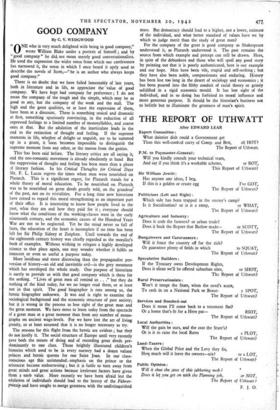GOOD COMPANY
By C. V. WEDGWOOD
" ONE who is very much delighted with being in good company," wrote William Blake under a portrait of himself ; and by " good company " he did, not mean merely good conversationalists. He used the expression the wider sense from which our carelessness has narrowed it, the sense in which I once heard it aptly used to describe the novels of Scott,—" he is an author who always keeps good company."
There is no doubt that we have failed lamentably of late years, both in literature and in life, to appreciate the value of good company. We have kept bad company for preference ; I do not mean the company of the tough and the simple, which may be as good as any, but the company of the weak and the null. The high and the great qualities, or at least the expression of them, have been at a discount.. There is something stoical and dramatic at first, something spuriously convincing, in the reduction of all expressed feelings to a limited number of monosyllables, and coarse ones at that. But the adulation of the inarticulate leads in the end to the extinction of thought and feeling. If the supreme moments in life, whether -of delight or anguish, are to be summed up in a grunt, it soon becomes impossible to distinguish the supreme moment from any other, or the moron from the genius.
This 'has been said before. The literary critics are all saying it, and the neo-romantic movement is already obediently at hand But the suppression of thought and feeling has been more than 'a phase of literary fashion. In his Critical Thoughts for Critical Days Mr. F. L. Lucas regrets the times when men were nourished on Plutarch. This is a significant regret, for Plutarch stands for a whole theory of moral education. To be nourished on Plutarch was to be nourished on great deeds greatly told, on the grandeui of the past, not on its trivialities. For a long time now historians have ceased to regard this moral strengthening as an important part of their office. It is interesting to know how people lived in the past, what they ate and how they paid for it ; everyone should know what the conditions of the working-classes were in the early nineteenth century, and the economic causes of the Hundred Years War are not to be neglected. Yet be the mind never so full of facts, the education of the heart is incomplete if no time has been left for Sir Philip Sidney at Zutphen. Until towards the end of the eighteenth century history was chiefly regarded as the moralist's book of examples. Without wishing to relegate a highly developed science to that place again, one may wonder whether it fulfils so innocent or even so useful a purpose today. insidious nsidious and more distressing than the propagandist per- version of history—an old and inevitable evil—is -the grey meanness which has enveloped the whole study. One purpose of historians is surely to provide us with that good company which is there for the seeking. "Lives of great men all remind us . . ." but they do nothing of the kind today, for we no longer read them, or at least not in that spirit. The good biographer is rare among us, the heroic biographer unknown. It was and is right to examine the sociological background and the economic structure of past society; but it is wrong in the process to lose sight of the great man and the great moment. We have more to learn today from the spectacle of a great man at a great moment than from any number of mono- graphs on ancient wage-levels. For we have lost the art of living greatly, or at least assumed that it is no longer necessary to try.
The reasons for this flight from the heroic are evident ; but they do not justify it. The social structure of Europe until very recently gave both the means of doing and of recording great deeds pre- dominantly to one class. Those brightly illustrated children's histories which used to be in every nursery had a dozen valiant princes and heroic queens for one Saint Joan. In our class- conscious age this unintended. emphasis on the prince or the aristocrat became embarrassing ; but it is futile to turn away from great minds and great actions because irrelevant factors have given them a snob value. More recently we have been afraid lest the adulation of individuals should lead to the heresy of the Fiihrer- prinzip and have sought to merge greatness with the undistinguished
mass. But democracy should lead to a higher, not a lower, estimate of the individual, and what better standard of values have we by which to judge merit than the study of great men?
For the company of the great is good company as Shakespeare understood it, as Plutarch understood it. The past remains the source from which example and precept can still be drawn. Here, in spite of the debunkers and those who will spoil any good story by pointing out that it is poorly authenticated, here is our example and our hope. Men have been vile, stupid and self-seeking ; but they have also been noble, compassionate and enduring. History has been lost too long in the desert of sociology and economics ; it has been poured into the filthy conduit of racial theory or grimly solidified in a rigid economic mould. It has lost sight of the individual, and in so doing has forfeited its moral influence and more generous purpose. It should be the historian's business not to belittle but to illuminate the greatness of man's spirit.


























 Previous page
Previous page